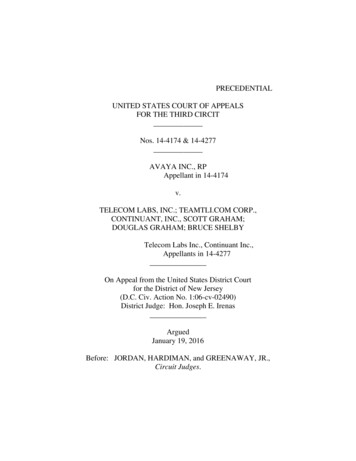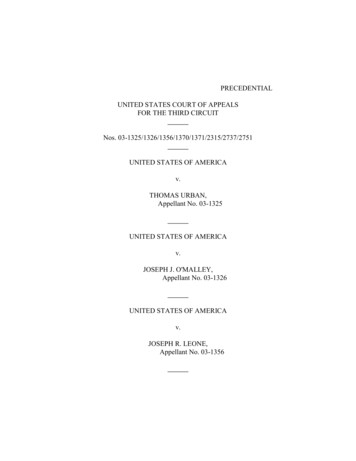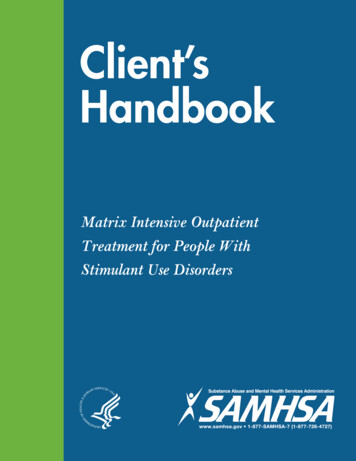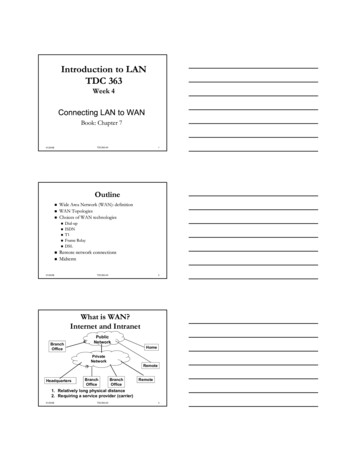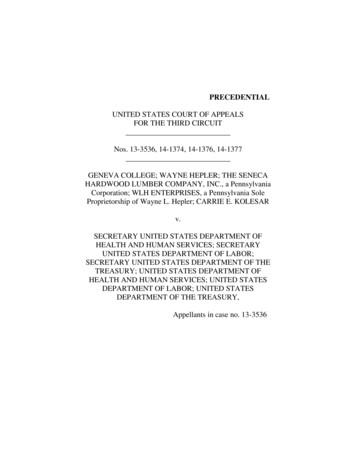
Transcription
PRECEDENTIALUNITED STATES COURT OF APPEALSFOR THE THIRD CIRCUITNos. 13-3536, 14-1374, 14-1376, 14-1377GENEVA COLLEGE; WAYNE HEPLER; THE SENECAHARDWOOD LUMBER COMPANY, INC., a PennsylvaniaCorporation; WLH ENTERPRISES, a Pennsylvania SoleProprietorship of Wayne L. Hepler; CARRIE E. KOLESARv.SECRETARY UNITED STATES DEPARTMENT OFHEALTH AND HUMAN SERVICES; SECRETARYUNITED STATES DEPARTMENT OF LABOR;SECRETARY UNITED STATES DEPARTMENT OF THETREASURY; UNITED STATES DEPARTMENT OFHEALTH AND HUMAN SERVICES; UNITED STATESDEPARTMENT OF LABOR; UNITED STATESDEPARTMENT OF THE TREASURY,Appellants in case no. 13-3536
GENEVA COLLEGE; WAYNE L. HEPLER, in his personalcapacity and as owner and operator of the sole proprietorshipWLH Enterprises; THE SENECA HARDWOOD LUMBERCOMPANY, INC., a Pennsylvania Corporation; CARRIE E.KOLESARv.SECRETARY UNITED STATES DEPARTMENT OFHEALTH AND HUMAN SERVICES; SECRETARYUNITED STATES DEPARTMENT OF LABOR;SECRETARY UNITED STATES DEPARTMENT OF THETREASURY; UNITED STATES DEPARTMENT OFHEALTH AND HUMAN SERVICES; UNITED STATESDEPARTMENT OF LABOR; UNITED STATESDEPARTMENT OF THE TREASURY,Appellants in case no. 14-1374MOST REVEREND LAWRENCE T. PERSICO, BISHOPOF THE ROMAN CATHOLIC DIOCESE OF ERIE, ASTRUSTEE OF THE ROMAN CATHOLIC DIOCESE OFERIE, A CHARITABLE TRUST; THE ROMANCATHOLIC DIOCESE OF ERIE; ST. MARTIN CENTER,INC., AN AFFILIATE NONPROFIT CORPORATION OFCATHOLIC CHARITIES OF THE DIOCESE OF ERIE;PRINCE OF PEACE CENTER, INC., AN AFFILIATENONPROFIT CORPORATION OF CATHOLICCHARITIES OF THE DIOCESE OF ERIE; ERIECATHOLIC PREPARATORY SCHOOL, AN AFFILIATENONPROFIT CORPORATION OF THE ROMANCATHOLIC DIOCESE OF ERIE2
v.SECRETARY OF UNITED STATES DEPARTMENT OFHEALTH AND HUMAN SERVICES; SECRETARY OFUNITED STATES DEPARTMENT OF LABOR;SECRETARY OF UNITED STATES DEPARTMENT OFTHE TREASURY; UNITED STATES DEPARTMENT OFHEALTH AND HUMAN SERVICES; UNITED STATESDEPARTMENT OF LABOR; UNITED STATESDEPARTMENT OF THE TREASURY,Appellants in case no. 14-1376MOST REVEREND DAVID A. ZUBIK, BISHOP OF THEROMAN CATHOLIC DIOCESE OF PITTSBURGH, asTrustee of the Roman Catholic Diocese of Pittsburgh, aCharitable Trust; THE ROMAN CATHOLIC DIOCESE OFPITTSBURGH, as the Beneficial Owner of the Pittsburghseries of The Catholic Benefits Trust; CATHOLICCHARITIES OF THE DIOCESE OF PITTSBURGH, INC.,an affiliate nonprofit corporation of The Roman CatholicDiocese of Pittsburghv.SECRETARY OF UNITED STATES DEPARTMENT OFHEALTH AND HUMAN SERVICES; SECRETARY OFUNITED STATES DEPARTMENT OF LABOR;SECRETARY OF UNITED STATES DEPARTMENT OFTHE TREASURY; UNITED STATES DEPARTMENT OFHEALTH AND HUMAN SERVICES; UNITED STATES3
DEPARTMENT OF LABOR; UNITED STATESDEPARTMENT OF THE TREASURY,Appellants in case no. 14-1377On Appeal from the United States District Courtfor the Western District of Pennsylvania(District Court Nos.: 1-13-cv-00303; 2-12-cv-00207 and2-13-cv-01459)District Judges: Honorable Joy Flowers Conti; HonorableArthur J. SchwabArgued on November 19, 2014Before: McKEE, Chief Judge, RENDELL, SLOVITER,Circuit Judges(Opinion filed: February 11, 2015)Stuart F. Delery, EsquireDavid J. Hickton, EsquireBeth S. Brinkmann, EsquireMark B. Stern, Esquire (ARGUED)United States Department of JusticeCivil DivisionRoom 7531950 Pennsylvania Avenue, N.W.Washington, DC 205304
Michael A. Comber, EsquireOffice of United States Attorney700 Grant StreetSuite 4000Pittsburgh, PA 15219Bradley P. Humphreys, EsquireUnited States Department of JusticeCivil Division, Federal Programs Branch20 Massachusetts Avenue, N.W.Room 7130Washington, DC 20530Adam C. Jed, EsquireUnited States Department of JusticeCivil DivisionAppellate Section, Room 7240950 Pennsylvania Avenue, N.W.Washington, DC 20530Alisa B. Klein, EsquireUnited States Department of JusticeCivil DivisionAppellate Section, Room 7325950 Pennsylvania Avenue, N.W.Washington, DC 20530Patrick Nemeroff, EsquireUnited States Department of JusticeCivil Division, Room 7217950 Pennsylvania Avenue, N. W.Washington, DC 205305
Eric R. Womack, EsquireCivil Division, Federal Programs Branch20 Massachusetts Avenue, N. W.Room 7130Washington, DC 20530Counsel for Appellants Secretary United StatesDepartment of Health and Human Services; Secretary UnitedStates Department of Labor; Secretary United StatesDepartment Of Treasury; United States Department of Healthand Human Services; United States Department of Labor;United States Department of the TreasurySteven H. Aden, EsquireGregory S. Baylor, Esquire (ARGUED)Matthew S. Bowman, EsquireAlliance Defending Freedom801 G Street, N.W.Suite 509Washington, DC 20001Erik W. Stanley, EsquireAlliance Defending Freedom15100 N. 90th StreetScottsdale, AZ 85260Kevin H. Theriot, EsquireAlliance Defending Freedom15192 Rosewood StreetLeawood, KS 662246
David A. Cortman, EsquireAlliance Defending Freedom1000 Hurricane Shoals, N.E.Building D - Suite 1100Lawrenceville, GA 30043David J. Mongillo, EsquireBradley S. Tupi, EsquireTucker Arensberg1500 One PPG PlacePittsburgh, PA 15222Counsel for Appellees Geneva College; SenecaHardwood Lumber Company, Inc.; Carrie E. Kolesar;Wayne HeplerPaul M. Pohl, Esquire (ARGUED)John D. Goetz, EsquireLeon F. DeJulius, Jr., EsquireIra M. Karoll, EsquireAlison M. Kilmartin, EsquireMary Pat Stahler, EsquireJones Day500 Grant Street, Suite 4500Pittsburgh, PA 15219Counsel for Appellees Most Reverend Lawrence T.Persico, Bishop Of The Roman Catholic Diocese of Erie, asTrustee of the Roman Catholic Diocese Of Erie, a CharitableTrust; The Roman Catholic Diocese of Erie; ST. MartinCenter, Inc., an affiliate Nonprofit Corporation of CatholicCharities of the Diocese of Erie; Prince of Peace Center, Inc.,7
an Affiliate Nonprofit Corporation Of Catholic PreparatorySchool, an Affiliate Nonprofit Corporation Of The RomanCatholic Diocese of Erie; Most Reverend David A. Zubik,Bishop of the Roman Catholic Diocese of Pittsburgh, asTrustee of the Roman Catholic Diocese of Pittsburgh, aCharitable Trust, Roman Catholic Diocese of Pittsburgh,Catholic Charities Diocese Of PittsburghDeborah J. Dewart, EsquireLiberty, Life and Law Foundation620 East Sabiston DriveSwansboro, NC 28584Counsel for Amicus Liberty, Life and LawFoundationWitold J. Walczak, EsquireSara J. Rose, EsquireAmerican Civil Liberties Union313 Atwood StreetPittsburgh, PA 15213Brigitte Amiri, EsquireJennifer Lee, EsquireAmerican Civil Liberties Union Foundation125 Broad Street, 18th FloorNew York, NY 10004Daniel Mach, EsquireAmerican Civil Liberties Union Foundation915 15th Street, 6th FloorWashington, DC 200058
Counsel for Amicus Julian Bond, The AmericanCivil Liberties Union and the American Civil Liberties Unionof PennsylvaniaCharles E. Davidow, EsquireAndree J. Goldsmith, EsquireKarin Dryhurst, EsquirePaul, Weiss, Rifkind, Wharton & Garrison2001 K Street, N.W., Suite 600Washington, DC 20006Marcia D. Greenberger, EsquireJudith G. Waxman, EsquireEmily J. Martin, EsquireGretchen Borchelt, EsquireLeila Abolfazli, EsquireNational Women’ Law Center11 DuPont Circle, NW, Suite 800Washington, DC 20036Counsel for Amicus National Women’s LawCenter and Twenty Other National, State and LocalOrganizationsAyesha N. Khan, EsquireAmerican United For Separation of Church and State1301 K Street, NW, Suite 850, East TowerWashington, DC 20005Counsel for Amicus American United forSeparation of Church and State9
Sarah Somers, EsquireMartha Jane Perkins, EsquireDipti Singh, EsquireNational Health Law Program101 East Weaver Street, Suite G-7Carrboro, NC 27510Counsel for National Health Law Program,American Public Health Association, National FamilyPlanning & Reproductive Health Association, NationalWomen’s Health Network, National Latina Institute ForReproductive Health, National Asian Pacific AmericanWomen’s Forum, Asian Americans Advancing Justice,AAJC, Asian Americans Advancing Justice, Los Angeles,Asian & Pacific Islander American Health Forum, NationalHispanic Medical Association, Forward Together, IPAS,Sexuality Information and Education Council of the U. S.(Siecus), HIV Law Project, and California Women’s LawCenter as Amici CuriaeKimberlee Wood Colby, EsquireCenter for Law & Religious FreedomChristian Legal Society8001 Graddock Road, Suite 302Springfield, VA 22151The Association of Gospel Rescue Missions,Prison Fellowship Ministries, Association of ChristianSchools International, National Association of Evangelicals,Ethics & Religious Liberty Commission of the SouthernBaptist Convention, American Bible Society, The Lutheran10
Church – Missouri Synod, Institutional Religious FreedomAlliance, and Christian Legal Society in Support of Appelleesand Urging AffirmanceOPINIONRENDELL, Circuit Judge:The appellees in these consolidated appeals challengethe preventive services requirements of the Patient Protectionand Affordable Care Act (“ACA”), Pub. L. No. 111-148, 124Stat. 119 (2010), under the Religious Freedom RestorationAct (“RFRA”), 42 U.S.C. §§ 2000bb to 2000bb-4.Particularly, the appellees object to the ACA’s requirementthat contraceptive coverage be provided to their planparticipants and beneficiaries.However, the nonprofitappellees are eligible for an accommodation to thecontraceptive coverage requirement, whereby once theyadvise that they will not pay for the contraceptive services,coverage for those services will be independently provided byan insurance issuer or third-party administrator.Theappellees urge that the accommodation violates RFRAbecause it forces them to “facilitate” or “trigger” theprovision of insurance coverage for contraceptive services,which they oppose on religious grounds. The appelleesaffiliated with the Catholic Church also object on the basisthat the application of the accommodation to Catholicnonprofit organizations has the impermissible effect ofdividing the Catholic Church, because the Diocesesthemselves are eligible for an actual exemption from the11
contraceptive coverage requirement. The District Courtsgranted the appellees’ motions for a preliminary injunction,and, in one of the cases, converted the preliminary injunctionto a permanent injunction. Because we disagree with theDistrict Courts and conclude that the accommodation placesno substantial burden on the appellees, we will reverse.I.BACKGROUNDA. Statutory and Regulatory Background1. The Affordable Care Act, the PreventiveServices Coverage Requirement, and theAccommodation for Religious NonprofitOrganizationsIn 2010, Congress passed the ACA, which requiresgroup health plans and health insurance issuers offeringhealth insurance coverage1 to cover preventive care andscreenings for women, without cost sharing (such as acopayment, coinsurance, or a deductible), as provided for inguidelines established by the Department of Health andEligible organizations may be either “insured” or “selfinsured.” An employer has an “insured” plan if it contractswith an insurance company to bear the financial risk ofpaying its employees’ health insurance claims. An employerhas a “self-insured” plan if it bears the financial risk of payingits employees’ claims. Many self-insured employers usethird-party administrators to administer their plans andprocess claims. See Cong. Budget Office, Key Issues inAnalyzing Major Health Insurance Proposals 6 (2008). Theappellees here fall into both categories.112
Human Services (“HHS”). 42 U.S.C. § 300gg-13(a)(4).2HHS requested assistance from the Institute of Medicine(“IOM”), a nonprofit arm of the National Academy ofSciences, to develop guidelines regarding which preventiveservices for women should be required. Group Health Plansand Health Insurance Issuers Relating to Coverage ofPreventive Services Under the Patient Protection andAffordable Care Act, 77 Fed. Reg. 8725, 8726 (Feb. 15,2012) (codified at 26 C.F.R. pt. 54; 29 C.F.R. pt. 2590; and45 C.F.R. pt. 147). The IOM issued a report recommending alist of preventive care services, including all contraceptivemethods approved by the Food and Drug Administration(“FDA”). The regulatory guidelines accordingly included“[a]ll Food and Drug Administration . . . approvedcontraceptive methods, sterilization procedures, and patienteducation and counseling for all women with reproductivecapacity,” as prescribed by a health care provider. 77 Fed.Reg. at 8725 (alteration in original). The relevant regulationsrequire coverage of the contraceptive services recommendedin the guidelines. See 26 C.F.R. § 54.9815-2713(a)(1)(iv); 29C.F.R.§ 2590.715-2713(a)(1)(iv);45C.F.R.§ 147.130(a)(1)(iv).The ACA’s preventive care requirements apply only to nongrandfathered group health plans and health insurance issuersoffering non-grandfathered health insurance coverage. See 45C.F.R. § 147.140 (exempting “grandfathered” plans—“coverage provided by a group health plan, or a group orindividual health insurance issuer, in which an individual wasenrolled as of March 23, 2010,” the date on which the ACAwas enacted “for as long as it maintains that status under therules of this section”).213
The implementing regulations authorize an exemptionfrom contraceptive coverage for the group health plan of a“religious employer.”45 C.F.R. § 147.131(a).Theregulations define a religious employer as a nonprofitorganization described in the Internal Revenue Codeprovision referring to churches, their integrated auxiliaries,and conventions or associations of churches, and theexclusively religious activities of any religious order. Id.(citing 26 U.S.C. § 6033(a)(3)(A)(i), (iii)).After notice-and-comment rulemaking, the Departmentof the Treasury, the Department of Labor, and the Departmentof Health and Human Services (the “Departments”) publishedfinal regulations in July 2013 that provided relief fororganizations that, while not “religious employers,”nonetheless oppose coverage on account of their religiousobjections. These regulations include an “accommodation”for group health plans established or maintained by “eligibleorganizations” (and group health coverage provided inconnection with such plans). See 26 C.F.R. § 54.98152713A(a), 29 C.F.R. § 2590-2713A(a), 45 C.F.R.§ 147.131(b); Coverage of Certain Preventive Services Underthe Affordable Care Act, 78 Fed. Reg. 39,870 (July 2, 2013)(codified at 26 C.F.R. pt. 54; 29 C.F.R. pts. 2510 & 2590; and45 C.F.R. pts. 147 & 156). An “eligible organization” meansa nonprofit organization that “holds itself out as a religiousorganization” and “opposes providing coverage for some orall of any contraceptive services required to be covered . . . onaccount of religious objections.” 45 C.F.R. § 147.131(b). Toinvoke this accommodation, an employer must certify that itis such an organization. Id. § 147.131(b)(4). Here, there isno dispute that the nonprofit religious organization appelleesare eligible organizations under these regulations.14
To take advantage of the accommodation to thecontraceptive coverage requirement, the eligible organizationmust complete the self-certification form, EBSA Form 700,issued by the Department of Labor’s Employee BenefitsSecurity Administration, indicating that it has a religiousobjection to providing coverage for the required contraceptiveservices. The eligible organization then is to provide a copyof the form to its insurance issuer or third-party administrator.78 Fed. Reg. at 39,875.33After these suits had been filed, the Supreme Court grantedan injunction pending appeal in Wheaton College v. Burwell,134 S. Ct. 2806 (2014), and ordered that the eligibleorganization applicant need not use EBSA Form 700 to notifyits insurance issuer or third-party administrator of its religiousobjection to the contraceptive coverage requirement; instead,if the organization notifies the government in writing of itsobjection, the government is enjoined from enforcing thecontraceptive coverage requirement against the organization.Id. at 2807. In response, interim final regulations were issuedin August 2014 allowing an eligible organization to opt outby notifying HHS directly, rather than notifying its insuranceissuer or third-party administrator; the eligible organizationalso need not use EBSA Form 700. Coverage of CertainPreventive Services Under the Affordable Care Act, 79 Fed.Reg. 51,092 (Aug. 27, 2014) (codified at 26 C.F.R. pt. 54; 29C.F.R. pts. 2510 & 2590; and 45 C.F.R. pt. 147); see also 29C.F.R. § 2590.715-2713A(b)(1)(ii)(B), (c)(1)(ii); 45 C.F.R.§ 147.131(c)(1)(ii).We conclude here that theaccommodation, even when utilizing EBSA Form 700, posesno substantial burden. To the extent that the Supreme Court’sorder in Wheaton may be read to signal that the alternative15
The submission of the form has no real effect on theplan participants and beneficiaries. They still have access tocontraception, without cost sharing, through alternatemechanisms in the regulations.4 Under these regulations, aneligible organization is not required “to contract, arrange, pay,or refer for contraceptive coverage” to which it objects onreligious grounds. 78 Fed. Reg. at 39,874. As a result, eitherthe health insurance issuer or the third-party administrator isrequired by regulation to provide separate payments forcontraceptive services for plan participants and beneficiaries.The ACA’s prohibition on cost sharing for preventiveservices, including contraception, bars the insurance issuer orthird-party administrator from imposing any premium or feeon the group health plan, or plan participants andbeneficiaries. Furthermore, the accommodation prohibits theinsurance issuer or third-party administrator from imposingsuch fees on the eligible organization. See 42 U.S.C.notification procedure is less burdensome than using EBSAForm 700, we also conclude that the alternative compliancemechanism set forth in the August 2014 regulations poses nosubstantial burden.4The Supreme Court has recognized that the accommodationensures that employees of entities with religious objectionshave the same access to all FDA-approved contraceptives asemployees of entities without religious objections toproviding such coverage. “The effect of the HHS-createdaccommodation on the women employed . . . would beprecisely zero. Under that accommodation, these womenwould still be entitled to all FDA-approved contraceptiveswithout cost sharing.” Burwell v. Hobby Lobby Stores, Inc.,134 S. Ct. 2751, 2760 (2014).16
§ 300gg-13(a); 29 C.F.R. § 2590.715-2713A(b)(2), (c)(2)(ii);45 C.F.R. § 147.131(c)(2)(ii). The insurance issuer or thirdparty administrator must “[e]xpressly exclude contraceptivecoverage from the group health insurance coverage providedin connection with the [eligible organization’s] group healthplan” and “segregate premium revenue collected from theeligible organization from the monies used to providepayments for contraceptive services.” 29 C.F.R. § 2590.7152713A(c)(2)(i)(A), (ii); 45 C.F.R. § 147.131(c)(2)(i)(A), (ii).The third-party administrator may seek reimbursement forpayments for contraceptive services from the federalgovernment. 29 C.F.R. § 2590.715-2713A(b)(3).Furthermore, the health insurance issuer or third-partyadministrator, not the eligible organization, provides notice tothe plan participants and beneficiaries regarding contraceptivecoverage “separate from” materials that are distributed inconnection with the eligible organization’s group healthcoverage, specifying that “the eligible organization does notadminister or fund contraceptive benefits, but that the thirdparty administrator or issuer, as applicable, provides separatepayments for contraceptive services, and must providecontact information for questions and complaints.” See 26C.F.R. § 54.9815-2713A(d); 29 C.F.R. § 2590.715-2713A(d);45 C.F.R. § 147.131(d).5 This is in accordance with thepreventive services requirement of the ACA.5As part of this separate notice regime, eligible organizationsdo not need to provide the names of their beneficiaries to theirinsurance issuers or third-party administrators, or otherwisecoordinate notices with them. See Priests for Life v. U.S.Dep’t of Health & Human Servs., 772 F.3d 229, 254 (D.C.Cir. 201
precedential united states court of appeals for the third circuit nos. 13-3536, 14-1374, 14-1376, 14-1377 geneva college; wayne hepler; the seneca
